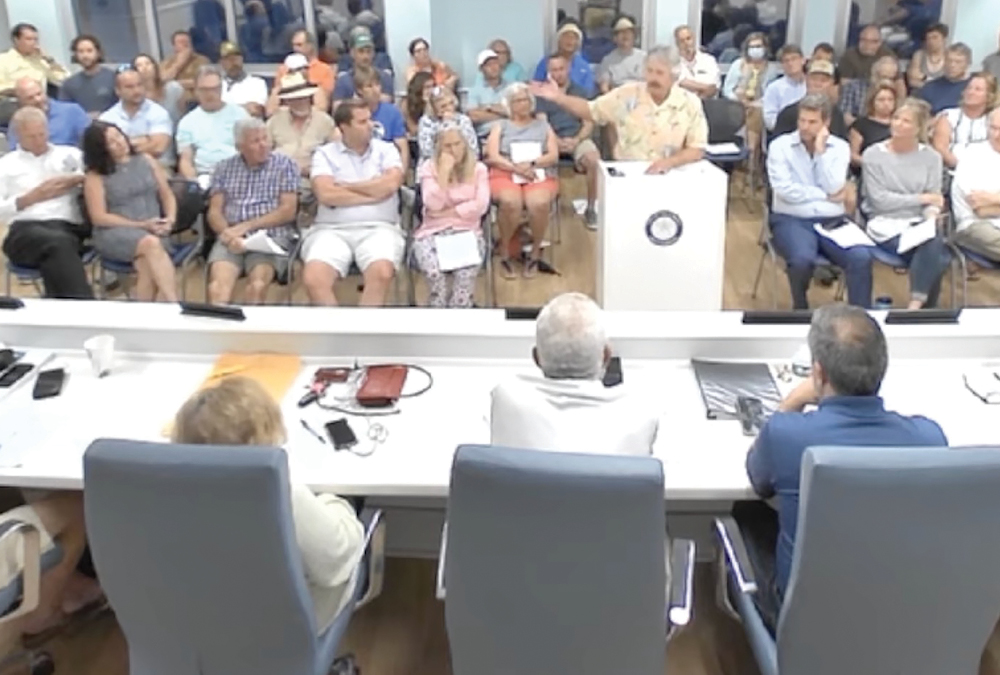Residents pack chamber to voice concerns over proposed ordinances
by Bill Davis | Staff Writer
Mayor Tim Goodwin saw one pof his two Short-Term Rental ordinances survive a late-June special City Council Meeting. But it took a while. A capacity crowd turned out for the Tuesday, June 28 meeting to speak for and against the mayor’s proposal.
At the meeting, Goodwin championed limiting the number of short-term rentals (STRs) to 800 island-wide, raising their application fees, requiring at least a 7-day stay, and maxing out the number of stays at 72 nights a year for certain rentals. Goodwin touted the plan as a way to return Folly Beach to those who live here, and not just invest here. But many residents who spoke at the meeting feared the limitations would do just the opposite — limiting their ability to use their primary residence to generate revenue, thus making it financially impossible to remain on the island.
The first ordinance, which proposed capping the number of STR licenses at 800, was met by fierce resistance in the community and on council. Many who spoke for the allotted two minutes at the public hearing railed against the cap, as well as the 7-day stay requirement, arguing that most of their guests stay for 2-3 nights, especially in the offseason.
Resident after resident said if the rules that were established when they bought their property were now changed that they wouldn’t be able to pay their bills moving forward.
The second ordinance only survived after several amendments were made to it. The lack of consensus on council proved that not everyone was intimately involved in the process of drafting the ordinances and that there’s still plenty more work ahead.
And more work means more costs, like hiring four full-time enforcement officers, which will have to be done before Council meets for a second reading on July 12. That could seal or doom the second ordinance’s fate.
Goodwin has been meeting regularly with Council and discussing how best to maintain the island’s quality of life, while still allowing residents and property owners to maximize their property values. His past efforts failed, like calling for a moratorium for work on an STR ordinance to be completed, but each time he’s brought the issue to Council it has helped further discuss the difficult balancing act between property rights and quality of life.
Local realtor Elton Culpepper has called Folly Beach home for the past 17 years, and he’s been an agent for the past seven years with Carolina One. Long before that, Culpepper was elected mayor of Walterboro at age 20, making him, at the time, the youngest mayor in America. So, he understands the challenges small cities face when making rules that effect people’s way of life. But before the meeting, Culpepper warned that Goodwin’s recommendations would negatively impact people’s property values by taking away their ability to use them as a revenue generator.
The ordinance suggested that short term rentals be classified as either “assessment restricted rentals” or “non-restricted rentals.” The assessment restricted rentals would be taxed at 4-percent property rate and have a maximum rental potential of 72 nights a year without penalty; whereas “non-restricted” rentals would be taxed at a 6-percent property tax rate and are eligible to be rented 365 nights with no penalty. It would also change to annual rental permit fees for $360 per year for assessment restricted rentals and $1,825 per year for non-restricted rentals.
Even for people who wouldn’t take part in the mayor’s 4-percent and 6-percent, two-tier system, when it came time to sell their home, Culpepper says it wouldn’t fetch as much on the market because the new owners wouldn’t be able to do with it as they may want.
For instance, for some in the housing market, buying a house on Folly may demand more than 72 days rented out to make it feasible for them to purchase it. That encumbrance could drive down the value of the property.
Goodwin says that real estate agents, like Culpepper, are automatically against anything that doesn’t make them money. And he added that the majority of complaints he’s received have been from agents like Culpepper. But at the meeting there were far more than realtors worried about the implications of restricting homeowners ability to use their properties as a STR.
Another issue are noise and other ordinance violations that STRs are often blamed for. Culpepper claims to have reviewed all the calls for service on STRs and the number is incredibly low, from his perspective. Either, he says, STRs aren’t the problem the mayor is making them out to be or the city isn’t enforcing the ordinances currently on the books. The mayor says Culpepper should sell a bunch of houses around his own residence for use as STRs before criticizing, and not call the police should they act up. Culpepper says he did actually sell a house next to his residence that is being used as a STR and says he’s not had any problems with it.
Goodwin says he’s doing what’s right for Folly, regardless of vote-counts and that Councilmembers “have to run on their own votes.” Translation: half the seats on Council are up again in two years and how they vote on these issues could come back to haunt them.














